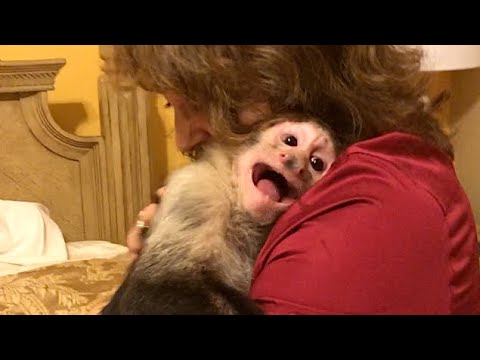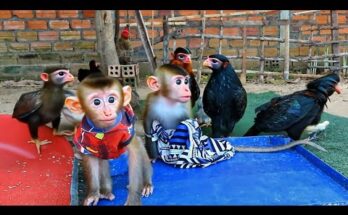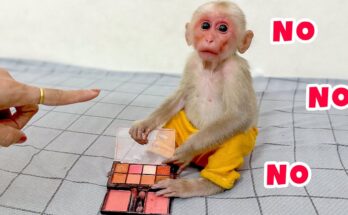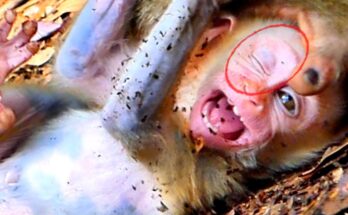
In the animal kingdom, we often associate intelligence, emotion, and memory with our fellow humans or great apes like chimpanzees and orangutans. But every now and then, nature surprises us—and touches our hearts in unexpected ways. One such emotional revelation came from a capuchin monkey who reminded us that love and longing aren’t limited to people. When separated from his beloved elder—a grandmother figure—this small primate displayed deep feelings of attachment, and his reaction to their reunion melted hearts around the world.
Capuchin monkeys, native to Central and South America, are known for their cleverness, social intelligence, and playful personalities. They’re often seen using tools, solving puzzles, and grooming each other as part of complex social rituals. These monkeys live in tight-knit troops where bonds between individuals—especially across generations—can be as powerful as those in human families.
The story of this particular capuchin begins in a sanctuary nestled in the forests of Costa Rica. The sanctuary, home to rescued and rehabilitated monkeys, mimics the structure of wild troops and allows older and younger monkeys to live together in enriched, natural environments. In this sanctuary, one young capuchin, whom staff named Nico, had formed an especially strong connection with an elderly female—nicknamed “Grandma Rosa” by the caretakers.
Rosa wasn’t Nico’s biological grandmother, but age and wisdom had made her a respected elder in the group. Nico gravitated toward her, often seen clinging to her side, grooming her, or mimicking her movements. She, in turn, showed him patience and protection, guiding him through social cues and conflicts with other monkeys. Their bond became one of the most endearing parts of life at the sanctuary.
But as with any family, sometimes separation is unavoidable. Rosa had to be moved temporarily to a special enclosure for medical care due to a leg injury. It was only meant to be a few days, but Nico took it hard. Caretakers noticed changes almost immediately—he became more withdrawn, less playful, and often sat in the corner near where she had last been. He even called out at night with soft vocalizations the staff hadn’t heard before.
At first, some thought it was coincidence or temporary confusion. But Nico’s behavior suggested something deeper: longing and sadness. While monkeys are known to form attachments, Nico’s emotional reaction highlighted a depth of feeling rarely captured on camera.
When Rosa finally returned—fully healed and walking with her usual dignified stride—something magical happened. The moment she entered the shared space again, Nico froze. His eyes locked on her. Then, with a burst of speed and unmistakable excitement, he ran to her, wrapping his arms around her in a tight embrace. The other monkeys watched as Nico climbed into her lap and nuzzled her neck, vocalizing softly and clinging to her like a long-lost child reuniting with a parent.
The staff, seasoned animal caretakers, were visibly moved. Some had tears in their eyes. The reunion, caught on video, quickly made its way onto social media and touched millions. “Capuchin Monkey Missed Grandma!!” became a viral headline, but the moment went far beyond clicks or views. It reminded people everywhere that animals, like us, experience grief, attachment, and joy.
What makes this story so impactful isn’t just the cuteness of the monkeys—it’s what it teaches us about the emotional lives of nonhuman animals. For decades, scientists debated whether animals could feel emotions. Today, we know better. Numerous studies show that animals experience a range of emotions—from joy and empathy to sorrow and even love.
Capuchins, in particular, are among the most socially advanced monkeys. In the wild, they live in multi-generational groups and depend on strong social bonds for survival. They remember faces, hold grudges, and form alliances. Their brains are large relative to their body size, and they’re capable of using tools and solving complex problems. But what often gets overlooked is their capacity for emotional intelligence.
Nico and Rosa’s bond mirrors the kind of affection we see between grandparents and grandchildren in human society. Grandparents often serve as protectors, teachers, and safe havens. In return, they receive adoration, comfort, and loyalty. Nico’s devotion to Rosa—and his emotional response to her absence—suggests these kinds of intergenerational bonds may not be uniquely human after all.
As we continue to study and learn from animals, stories like this help bridge the gap between species. They invite empathy and challenge us to rethink our assumptions about what it means to be “just an animal.” If a capuchin monkey can miss someone so deeply, perhaps it’s time we view animals not just as creatures of instinct, but as beings with emotional worlds of their own.
The sanctuary staff has since used this moment to educate visitors and online followers about the importance of family, both human and animal. Nico and Rosa continue to live together, their bond as strong as ever. Staff report that Nico has returned to his playful, affectionate self, often sticking close to Rosa and even helping her during feeding time by bringing her fruit.
In a world where headlines often focus on conflict and crisis, the story of a small monkey missing his “grandma” offers something refreshingly simple and profoundly meaningful: a reminder that love, in all its forms, is a universal language.


